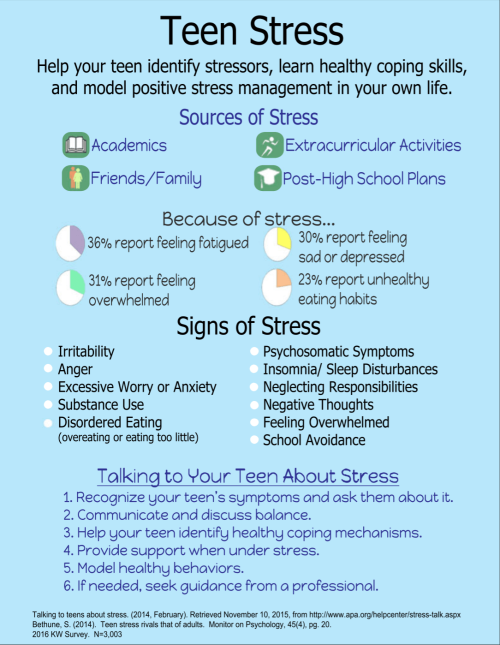Stress
In a study by the American Psychological Association, American teens reported only sleeping 7.4 hours on a school night and 8.1 hours on a non-school night, much less than the recommended 8.5-9.25 hours. More than a third of respondents said that they lie awake at night and can’t sleep due to stress. The Partnership for a Drug Free America survey found that 73% of respondents said that school stress was the primary reason for their drug and alcohol use. Our children and teens are more stressed than ever and it’s effecting both their mental and physical health.
The pressures of school; family and community expectations; over-scheduling and trying to balance school with a job, sports, after school activities, and family obligations; dating/friend relationship or conflicts with family or peers; looks and physical appearance; and lack of sleep, all lead to children and teens struggling to handle the stress of everyday life.
Learning how to manage stress and practice stress-relief strategies is a lifelong skill. To help your child (and yourself) manage stress, teach them the following tips:
- Sleep – be sure you are getting enough!
- Eat regularly
- BREATHE!!
- Take a walk – research shows that even a short walk outside reduces stress
- Practice relaxation exercises including muscle relaxation techniques, abdominal breathing, or meditation
- Exercise
- Take a break – read a book, listen to music, draw a picture, play catch, dance, do something you love and makes you happy
- Spend time with friends and family
- HAVE SOME FUN!
- Laugh
- Talk with someone about your thoughts and feelings
- Enjoy some quiet time with a pet – did you know that petting an animal reduces stress?
- Turn off screens 1-2 hours before bed (computer, phone, tv)
- Focus on what you can control
- Set small goals that can be accomplished
- Practice or role-play situations that cause stress
- Create balance in your life and schedule
- BE KIND TO YOURSELF – realize that you don’t have to be perfect; that while academics are important, remind yourself that your worth is not based on your grades, how you do on a test, or how well you perform in other areas of your life; you are wonderful and valuable and important because you are YOU!

How parents can help:
- LISTEN carefully and
- CONNECT with your kids.
- MONITOR for unhealthy levels of stress – lack of sleep, loss of appetite, moodiness, unusual behavior.
- WATCH for signs of overload.
- Encourage DOWNTIME.
- Be SUPPORTIVE.
- LEARN techniques for reducing stress (above) and PRACTICE them TOGETHER.
- MODEL a healthy life balance.
To learn more about stress and anxiety and how to tell the difference, watch the BStrong Together video Understanding and Responding to Stress and Anxiety above with guest experts Jacqueline Rhew and Dr. Robin Choquette – co-creators of the Successful Parenting Plan and the Successful Parenting Podcast.
Websites
Talking to Teens About Stress
American Psychological Association
Stress and Sleep
American Psychological Association
Teens and Stress: How to Keep Stress in Check
American Psychological Association
“5 Things You Should Know About Stress”
National Institutes of Health
“Helping Children Handle Stress”
HealthyChildren.org
“Stress Relief for Kids: How to Make Stress Relief Part of Your Kids’ Lives”
Very Well
“Bad at remembering to take care of yourself? These 25 tips can make it almost automatic.”
Unworthy & Cigna Healthcare
Tools
Headspace
Themed sessions on everything from stress to sleep, bite-sized meditations for busy schedule, and SOS exercises in case of sudden meltdowns. Free App from the Apple Store or Google Play. Free content plus additional content by subscription.
Calm
Guided meditation, breathing exercises, mindfulness exercises and help to sleep. Free App from the Apple Store or Google Play. Free content plus additional content by subscription.
Books
Stress Reduction Workbook for Teens
by Gina M. Biegel MA LMFT
The Mindful Teen: Powerful Skills to Help You Handle Stress One Moment at a Time
by Dzung X. Vo MD FAAP
Coping Skills for Kids Workbook: Over 75 Coping Strategies to Help Kids Deal with Stress, Anxiety and Anger
by Janine Holloran
Master of Mindfulness: How to Be Your Own Superhero in Times of Stress
by Laurie Grossman
The Relaxation and Stress Reduction Workbook for Kids: Help for Children to Cope with Stress, Anxiety, and Transitions
by Lawrence E. Shapiro, PhD
